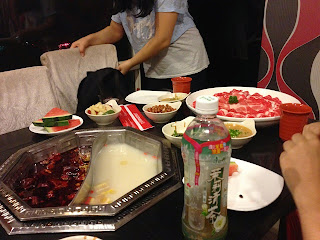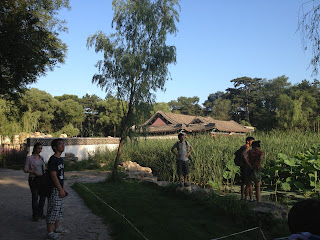After an intense first semester and a 4-hour long final exam, 10 PIB students filed onto a train at Beijing Station to Chengde (承德), a small city north-east of Beijing where China's last dynasty of emperors spent their summer vacations in a mountain resort (bishushanzhuang) and held meetings with neighboring countries.
PIB gives all students a 3-4 day long weekend between the first and last four weeks to relax and see some China outside of Beijing. The trips are all planned by the students themselves, unlike Harvard's program which I believe offers week-long "social study" projects to various set locations. Though a bit short, PIB's break allows students to freely explore places like Shanghai, Qingdao, Xi'an, Datong, and Chengde.
--
 |
| The view from one of the platforms at Puning Temple |
Our group spent two days in Chengde, arriving Friday afternoon and leaving Sunday morning. We stayed at the very nice not-so-expensive (only) hostel in Chengde, whose owner picked us up from the train station and gave us a map and recommendations on what to do in the city.
 |
Our group spinning prayer wheels, which in Tibetan Buddhism
has the same effect as saying the inscribed prayer. These
also included helpful arrows to help those of us who don't read
Sanskrit spin them in the right direction. |
 |
| We were a little dubious of this elephant's eyes |
 |
The inside of Puning Temple, with a stage for entertaining
visitors. I keep thinking those things are clotheslines |
 |
| The view from the top of the Red Platform at the Little Potala Palace |
From then we toured three temples on the outskirts of Chengde, including Putuo Zongchengzhi temple (built in the style of the Potala Palace in Tibet), Xumi Fushou Temple, and Puning Temple (which contains a very very large wooden Buddha with a thousand arms and a thousand eyes. Actually each hand of each arm contains an eye, which I thought was interesting. No photos inside of course). At Puning Temple, I burned some incense in very awkward fashion.
 |
| View from the bottom of the Red Platform at Little Potala Palace |
 |
| Another view from the top of Puning Temple |
 |
| Joe Package's Stewed Meat (lurou) |
The restaurant that we went to for dinner that day had fantastic menu translations. We spent a while wondering who Joe Package was.
 |
"Mr Tat's Wing" We're
guessing he's friends with Joe Package |
 |
| You can order "The Crabs" |
We spent the next day wandering the Mountain Resort, which takes up an enormous part of the city. Apparently the emperors took all the flat ground in the otherwise mountainous area, walled it off, and over 90 years built a huge resort. The result was visually amazing the day we went, with the sun throwing off a dry heat over the many small lakes, buildings, and gardens. Needless to say I took a lot of pictures.
 |
| Spinning the water wheel. |
In the morning I visited a small shop selling name charms near a waterwheel. When we returned at the end of the day, despite my wearing sunglasses and this really peculiar rainbow paper hat, the salesman walked up to me and, pointing, said "
I know you!" He was amazed that we had been there from 8AM to (eventually) 5:30PM, although I would say that one could definitely spend an entire day in the Mountain Resort.
The entrance fee was 120RMB, but although we had heard that student discounts wouldn't work, we managed to get in half-price anyway. I suppose the lesson is that it can't hurt to flash your Beijing Normal ID card (it's actually a lunch card) at all of these places.
A part of our group split off early and got a bit lost wandering huge, hilly forest that wraps around the main area, while my friend and I explored each island in sequence. In the afternoon, we regrouped, walked around some more, and ended the day with some boating around the lakes (unfortunately our motor boat had some weird engine issue and was quite slow).
Sometime during the day, a college professor from Chengde Normal University came up to us and asked us if we were foreigners. She was giving a survey about the state of Chengde's public toilets. Foreigners were unusually rare in the park that day. One of us asked how she'd known we were foreigners (most of us are Chinese American). "Did you hear us speaking English?" In the end it was our accented Chinese that gave it away - she thought I was Japanese.
All in all, it was heartwarming to see a teacher go to such lengths, apparently to satisfy the curiosity of her students, to find out what foreigners thought of Chengde's toilets - about their cleanliness, convenience, and artistic design. I actually think Chengde's toilets are pretty nice.
 |
| Older Chengde residents dancing downtown |
 |
| Guinea pigs and a dwarf rabbit outside a pet store |
We also visited the local beer garden for lamb barbecue of dubious origin. Aside from lamb we tried sugared bread, as well as BBQ cicada pupae (which has the texture of a shrimp shell on the outside and weird tofu on the inside).
Essentially what I wanted to get out of this long weekend were mountains, water, and history. (山,水,和历史). I'd say that Chengde meets these criteria without being too far away, and might be a good PIB midterm trip for those who'd prefer a relatively inexpensive trip and a relaxing break from the big city.
Cheers,
令鑫
























































